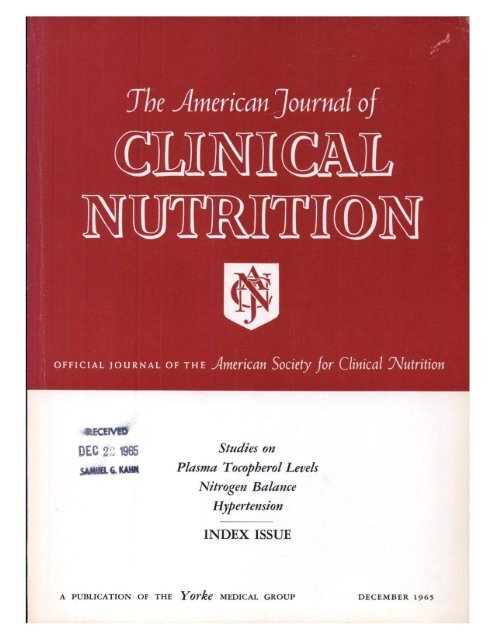Vitamin D3 and marine ω-3 fatty acids supplementation and leukocyte telomere length: 4-year findings from the VITamin D and OmegA-3 TriaL (VITAL) randomized controlled trial
IF 6.5
1区 医学
Q1 NUTRITION & DIETETICS
引用次数: 0
Abstract
Background
Limited studies suggest that vitamin D or omega 3 fatty acids (n-3 FAs) supplementation may be beneficial for telomere maintenance, however, evidence from large randomized clinical trial is lacking.
Objective
We aimed to determine whether vitamin D or n-3 FAs supplementation reduce leukocyte telomere length (LTL) attrition over time by leveraging the VITamin D and OmegA-3 TriaL (VITAL) trial.
Methods
VITAL is a large, randomized, double-blind, placebo-controlled tr ial with a 2 x 2 factorial design of vitamin D3 (2,000 IU/day) and marine n-3 FAs (1 g/day) supplements for 5 years among a representative sample of 25,871 US females ≥55 and males ≥50 years of age. The VITAL Telomere study (NCT04386577) included 1054 participants who were evaluated in person at the Harvard Clinical and Translational Science Center. LTL was determined by the Absolute Human Telomere Length Quantification quantitative Polymerase Chain Reaction (PCR) method at baseline, Year 2, and Year 4. The pre-specified primary outcome measures were changes in LTL between baseline, Year 2 and Year 4. Analyses of intervention effect used mixed-effects linear regression models.
Results
LTL was measured in a total of 2,571 samples from the 1031 participants at baseline, year 2, and year 4. Compared to placebo, vitamin D3 supplementation significantly decreased LTL attrition by 0.14 kilo base pairs (kb) (95%CI: 0.007, 0.27) over 4 years (p = 0.039). Overall trend analysis showed that the vitamin D3 supplementation group had LTLs that were about 0.035 kb higher per year of follow-up compared to placebo group (95%CI: 0.002, 0.07, p=0.037). Marine n-3 FAs supplementation had no significant effect on LTL at either year 2 or year 4.
Conclusion
4-years of supplementation with 2000 IU/day vitamin D3 reduced telomere attrition by 140 bp, suggesting that vitamin D3 daily supplementation with or without n-3 FAs might have a role in counteracting telomere erosion or cell senescence.
维生素D3和海洋Omega-3脂肪酸补充与白细胞端粒长度:VITAL随机对照试验4年的发现。
背景:有限的研究表明补充维生素D或ω -3脂肪酸(n-3 FAs)可能有利于端粒维持,然而,缺乏大型随机临床试验的证据。通过维生素D和OmegA-3试验(VITAL),我们假设补充维生素D或n-3脂肪酸可以减少白细胞端粒长度(LTL)的消耗。方法:VITAL是一项大型、随机、双盲、安慰剂对照试验,采用2 × 2因子设计,在25,871名年龄≥55岁的美国女性和年龄≥50岁的男性中,使用维生素D3 (2,000 IU/天)和海洋n-3 FAs (1 g/天)补充剂,持续5年。VITAL端粒研究(NCT04386577)包括1054名参与者,他们在哈佛临床和转化科学中心进行了亲自评估。在基线、第2年和第4年,采用绝对人端粒长度定量聚合酶链反应(PCR)法测定LTL。预先指定的主要结局指标是基线、第2年和第4年之间LTL的变化。干预效果分析采用混合效应线性回归模型。结果:在基线、第2年和第4年,从1031名参与者中共测量了2571个样本的LTL。与安慰剂相比,维生素D3补充剂在4年内显著减少了0.14千克碱基对(kb)(0.01, 0.27)的LTL损耗(p = 0.039)。总体趋势分析显示,与安慰剂组相比,维生素D3补充组的LTLs每年随访约高0.035 kb (0.002, 0.07, p=0.037)。添加海洋n-3脂肪酸对第2年和第4年的LTL均无显著影响。结论:连续4年每天补充2000 IU维生素D3可使端粒磨损减少140 bp,这表明每天补充维生素D3或不补充n-3 FAs可能具有对抗端粒侵蚀或细胞衰老的作用。临床试验注册号:bernct04386577, https://clinicaltrials.gov/study/NCT04386577?term=NCT04386577&rank=1。
本文章由计算机程序翻译,如有差异,请以英文原文为准。
求助全文
约1分钟内获得全文
求助全文
来源期刊
CiteScore
12.40
自引率
4.20%
发文量
332
审稿时长
38 days
期刊介绍:
American Journal of Clinical Nutrition is recognized as the most highly rated peer-reviewed, primary research journal in nutrition and dietetics.It focuses on publishing the latest research on various topics in nutrition, including but not limited to obesity, vitamins and minerals, nutrition and disease, and energy metabolism.
Purpose:
The purpose of AJCN is to:
Publish original research studies relevant to human and clinical nutrition.
Consider well-controlled clinical studies describing scientific mechanisms, efficacy, and safety of dietary interventions in the context of disease prevention or health benefits.
Encourage public health and epidemiologic studies relevant to human nutrition.
Promote innovative investigations of nutritional questions employing epigenetic, genomic, proteomic, and metabolomic approaches.
Include solicited editorials, book reviews, solicited or unsolicited review articles, invited controversy position papers, and letters to the Editor related to prior AJCN articles.
Peer Review Process:
All submitted material with scientific content undergoes peer review by the Editors or their designees before acceptance for publication.

 求助内容:
求助内容: 应助结果提醒方式:
应助结果提醒方式:


